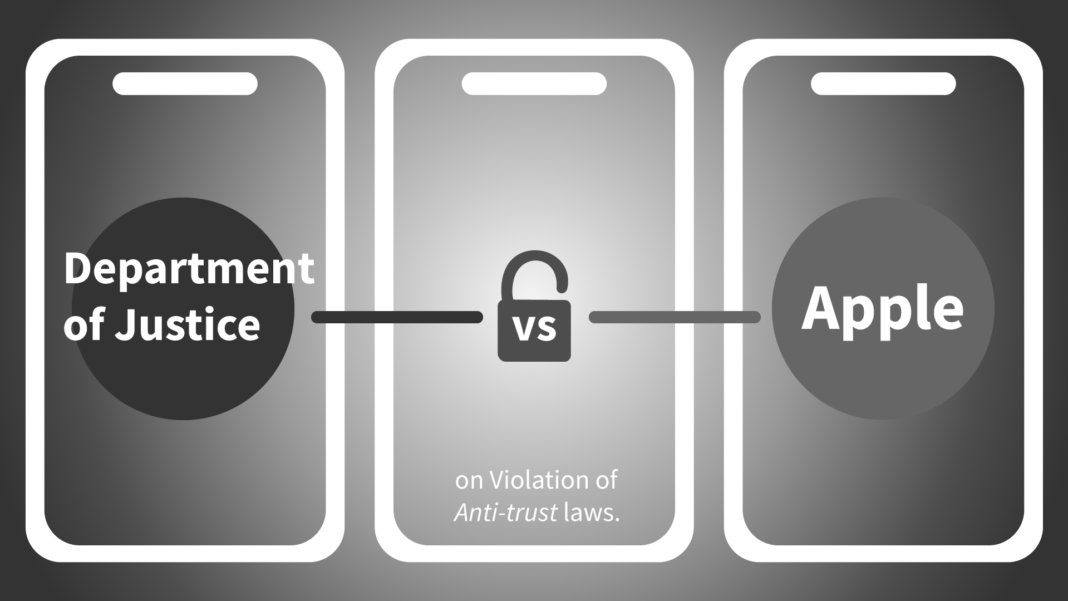Apple is currently grappling with a historic lawsuit issued by the Department of Justice, alleging that the tech giant has consciously tried to maintain a monopoly over the iPhone market.
The lawsuit, issued on Mar. 21, accuses Apple of violating Section 2 of the Sherman Act by using their monopoly to charge extravagant prices for their iPhones, which normally range from $450 to $1500.
“We allege that Apple has maintained monopoly power in the smartphone market, not simply by staying ahead of the competition on the merits, but by violating federal antitrust law,” U.S. Attorney General Merrick B. Garland stated in the lawsuit. “If left unchallenged, Apple will only continue to strengthen its smartphone monopoly.”
The DOJ alleges that in order to maintain this monopoly, Apple has employed key tactics to skillfully disarm their competition and dominate the market.
“For years, Apple responded to competitive threats by imposing a series of ‘Whac-A-Mole’ contractual rules and restrictions that have allowed Apple to extract higher prices from consumers, impose higher fees on developers and creators, and to throttle competitive alternatives from rival technologies,” Assistant Attorney General Jonathan Kanter said .
These rules and restrictions have been selectively imposed on certain technologies that Apple sees as threatening to their monopoly.
In doing so, Apple has consciously blocked innovative “super” apps, suppressed mobile cloud streaming services, excluded cross-platform messaging apps, diminished the functionality of non-Apple smartwatches and limited third party digital wallets.
“Apple is not so much worried about competing directly against smart wallets, smart watches, super apps, and cloud-based apps, but they are worried that all those things together could make it so the underlying technology means nothing,” said John Newman, professor of law with an expertise in antitrust and competition law at the University of Miami.
Super apps, like Alipay and Wechat, appear to be Apple’s biggest threat. These apps, developed by third parties, allow users to access many different applications all in the same app, without having to remember multiple passwords and switch to different apps.
For example, a user could order food delivery, request money from their roommate for it, and then check the doorbell camera to see when the delivery arrives all in the same application.
Depending on how fast these super apps progress and develop, they could convince users to ditch Apple’s ever-increasing phone prices in favor of a cheaper phone capable of running “super apps.”
“The simplest way to explain it is that you have a monopoly over the horse drawn carriage market in 1910,” Newman said “The theory of the complaint is not that the horse-drawn carriage monopolist is fighting down other horse-drawn carriage monopolists. It’s more that the horse-drawn carriage monopolist is seeing the rise of cars and they’re going over and dynamiting the car factory.”
The DOJ is not unfamiliar with massive tech lawsuits and in their lawsuit they specifically say, they are modeling this lawsuit after a case from over twenty years ago.
The lawsuit they are citing was in 1998, when the DOJ alleged Microsoft was violating antitrust laws, in an effort to monopolize the market for the Windows operating system.
To do this Microsoft restricted the use of other web browsers and media players on their Windows operating systems.
“Microsoft was a monopolist in operating systems. They didn’t care about having to compete against web browsers, but if web browsers make it so that people are not sensitive to which operating system they use, that is a bad thing for Microsoft,” Professor Newman said, “All of a sudden Microsoft will be unable to charge $400 bucks for Windows, if all people care about is having an operating system that can boot up and open an app.”
This strategy is similar to what the DOJ believes Apple has been doing over the past couple of years. Unfortunately for Apple, Microsoft was found guilty of violating the Sherman Act and after a semi-successful appeal, they were forced to settle.
Just as this isn’t the DOJ’s first big tech battle, this is also not Apple’s first rodeo battling the federal justice system.
In 2010, Apple and five other tech companies settled with the DOJ after allegedly colluding to prevent skilled employees from getting better salaries.
Subsequently, in 2016, Apple was forced to pay $450 million to settle DOJ allegations that they colluded with five publishers to increase e-book prices.
The most recent lawsuit was filed in a federal court in New Jersey and follows the Biden Administration’s recent pattern of attempting to regulate big tech.
Given that a judge has not been assigned to the case yet, the lawsuit is estimated to take multiple years in court and will require Apple to hire hundreds of lawyers in efforts to defend their technology empire.







